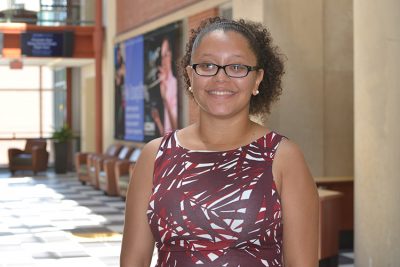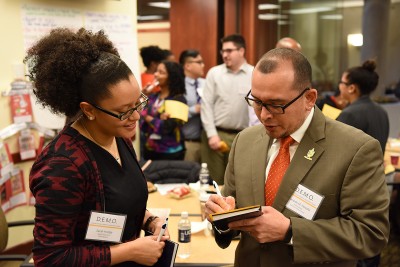
When recent Neag School graduate Sarah Hodge ’15 (ED), ’16 MA was still a high schooler, she enrolled as one of the first students in the Teacher Preparatory Studies Program at Bulkeley High School, an initiative designed to prepare and encourage talented students, particularly from minority groups, to become teachers. Although she found that she liked working with students, a teaching career was not necessarily what she thought she wanted to pursue at the time.
Later enrolled as an undergraduate at UConn, she took a class with Noemi Maldonaldo-Picardi, a Neag School staff member she had previously met through Bulkeley’s teacher prep program. Maldonado’s class, “Inspiring the Urban Educator,” became the first college course Hodge immediately found enjoyable.
The class was small and had numerous guest speakers, one of whom was associate professor Jason Irizarry. He talked about culture, the achievement gap, and other topics that Hodge says particularly resonated with her on a personal level.
Maldonado encouraged Hodge, whom she always saw participating in class, to consider applying to the Neag School. A biology major at the time, Hodge switched majors to science education, ultimately allowing her to combine the things she loved most: science, working with children, and connecting with the community.
Transitioning to School in the U.S.
At 9 years old, Hodge immigrated to the U.S. from Puerto Rico with her mother and two brothers. Numerous members of her mother’s side of the family were living in Hartford. Most of them had not finished high school, although many eventually earned their GEDs.
“My grandparents went [to school] up to the third grade,” Hodge says. “Preparing to go college was something my mother always wanted for me.”
Hodge’s mother was born in the U.S., so she taught her children a little bit of English. When Hodge started attending school in Connecticut in the fourth grade, she remembers feeling overwhelmed, encountering her first male teacher and a different environment, where she didn’t know anyone. “I cried because I didn’t want to go into the classroom,” she recalls.
She received English Language Learner services and, the following year, entered a bilingual class. By sixth grade, she was fully immersed in an English language speaking-only classroom.
Along the way, she fell in love with science. “I knew I wasn’t the best writer, and I wasn’t the best reader, but I could do science,” she says. She participated with a science fair and by seventh and eighth grades, became more confident in her writing and speaking skills. “It was through science that I was just like, this is it for me. I’m good at science. I like science, and I could do science.”
“The students in Windham are very lucky to have Sarah as their teacher this fall. … She is one of the most conscientious, caring, and passionate future teachers I have worked with at UConn.” René Roselle, associate clinical professor
From Mentee to Mentor
Hodge’s time at UConn began with her participating in the University’s Student Support Services program (SSS), through which she met people from different towns, made new friends, and made connections on campus, even before the start of her freshman fall semester.
Through SSS, Hodge also became involved with numerous opportunities, including Study Abroad in London and peer mentoring, going on to grow active across campus with such groups as the Pre-Med Society, Tae Kwon Do, Big Brothers/Big Sisters, and, most recently, mentoring group Diverse Educators Making Outstanding Change (D.E.M.O.). She was also a Puerto Rican/Latin American Cultural Center (PRLACC) mentee. Looking back, she recalls: “Making friends wasn’t a problem because I joined every possible club.”
Through becoming a mentor with SSS students, she provided her mentees with social support, connections to the community, and insights on how to do their courses online, how to select a schedule, as well as how to find available campus resources.
“One thing I told them was to stay involved,” she says. “I feel like staying involved helps keep you grounded.”

Working With Children
Her involvement with Big Brothers/Big Sisters at UConn began to expose her to working with children beyond the classroom. Hodge met a young boy, Miguel, who had a story similar to hers. He was in fourth grade when they met and was also a new arrival from Puerto Rico. Hodge felt compelled to help him. “I want to share with other students, and show them they can be, what they can do, and help them grow,” she says.
Their relationship continued for the next three years. In addition to her assisting him with his homework – translating concepts to English or Spanish to help him along — they would also play basketball. “His thing was basketball, so we’d play,” she says. “Since UConn is the basketball capital of the world, he was a big fan.”
Hodge also spent time working at a summer camp in South Windham, Conn., working with people with a variety of development needs, from young children to adults in their 60s. Though initially an aspiring science teacher, she found that her experience with the campers led her to consider a career in special education.
“That summer changed my life completely,” she says. “It was just that moment, working with people with disabilities, that helped me determine what I wanted to do.”
She wanted to learn more about this path, so she shadowed a couple of classrooms and talked to a few teachers, to see how special education worked in a school. Through practicums at the Neag School, she was then able to teach science to special education students. “In my student teaching, we did observations, and [the students] were the scientists,” she says, coming to the realization that “you could incorporate science into anything.”
Looking Ahead
Now a UConn grad looking forward to her first year as a practicing teacher — having landed a position in special education at Windham Center in Windham, Conn. — Hodge has been able to rely on the networking sources, supporters, and mentors she has connected with along the way.
Associate clinical professor René Roselle, who once served as the Neag School’s advisor to the Bulkeley teacher prep program, has been one longtime source of support for Hodge. Before Hodge got into the Neag School, they would talk frequently. “René would ask for updates, wanting to know how I was doing,” Hodge says. Roselle mentored and advised her, which continued when Hodge became a Neag School student.
“The students in Windham are very lucky to have Sarah as their teacher this fall,” say Roselle, who is currently the Neag School professional development schools coordinator for Hartford. “She is a thoughtful and creative problem solver, who will work tirelessly to find ways to reach all of her students. Sarah takes the charge of delivering special education services to students very seriously and is a person of high integrity. She is one of the most conscientious, caring, and passionate future teachers I have worked with at UConn.”
Looking back on her past years of student activities and mentoring experiences, as well as her preparation for the classroom through student teaching and internships — including a stint of student teaching at her alma mater, Bulkeley High — Hodge is both excited and nervous for her new career, while grateful for the ongoing support of Roselle and her other mentors.
Although she may not, as a high schooler, have initially imagined for herself a career in teaching, she has now come full circle — going from a Bulkeley High student to a student teacher to graduate of the Neag School’s teacher preparation program, set to begin her professional career.
“I know I have a lot of resources,” she says. “I had all this support these past three years — along with the [Bulkeley] teacher prep program — so I’m ready.”
 Facebook
Facebook
 Twitter
Twitter
 LinkedIn
LinkedIn
